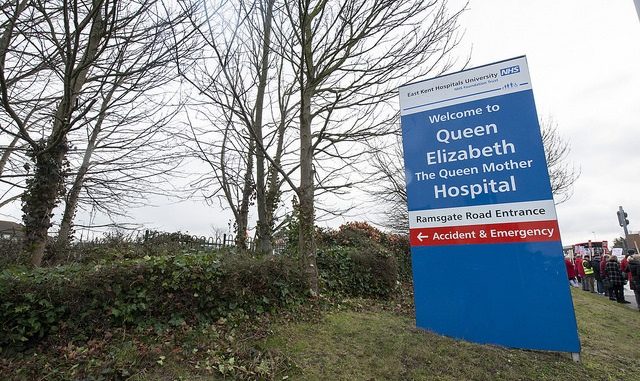
Proposals which could include moving many services, including accident & emergency, to a new build hospital in Canterbury have been given the go-ahead for the next steps at a meeting of the Sustainable Health Care in East Kent Joint Committee of NHS Clinical Commissioning Groups this week.
Changes are planned to east Kent’s urgent, emergency and acute medical care -including A&E departments – specialist care, and planned inpatient orthopaedic care (such as hip and knee operations).
Commissioners are also discussing whether to move maternity and children’s inpatient services to a new hospital in Canterbury and options for moving specialist services to either Canterbury or Ashford.
Currently the three main hospitals – at Ashford, Canterbury and Margate – each provide different services, with A&E departments at Margate and Ashford and an Urgent Care Centre at Canterbury. A range of specialist services are at different hospitals, such as the trauma unit at William Harvey Hospital and inpatient kidney services at the Kent and Canterbury Hospital.
NHS professions and the East Kent Hospitals University Foundation Trust (EKHUFT) say there is a body of evidence that shows specialist services, such as stroke, trauma, vascular and specialist heart services need to be centralised and located together.
The options will now be evaluated, looking at the potential impact across a range of issues including workforce and clinical performance; travel times for patients and visitors including ambulance, car and public transport; the time it would take to implement and the costs involved.
Potential option 1
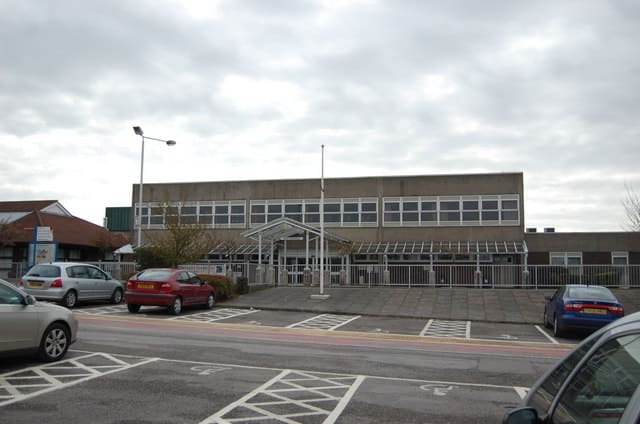
A much larger, modern, A&E at William Harvey Hospital, Ashford, which would also provide services for people that need highly specialist care (such as trauma, stroke, vascular and specialist heart services) in east Kent
an expanded, modern A&E at Queen Elizabeth the Queen Mother Hospital (QEQM), Margate, with inpatient care for people who are acutely unwell, emergency and day surgery, maternity and geriatric care
investment to modernise services at Kent and Canterbury Hospital which would then provide diagnostics (such as X-ray and CT scans), day treatments and surgery, some routine planned inpatient surgery, outpatient appointments and rehabilitation.
Urgent Treatment Centres treating illnesses and injuries which are not 999 emergencies, in all three hospitals.
Outpatient services at the Kent and Canterbury Hospital
Potential option 2
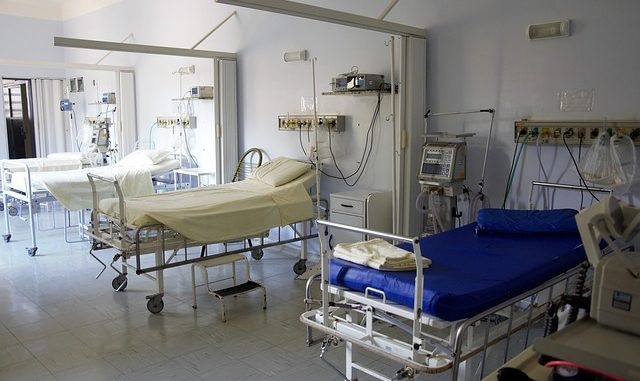
The development of a new hospital at the Kent and Canterbury Hospital and refurbishment of some of the current hospital buildings, to provide a single, modern, 24/7 A&E and all specialist services (such as trauma, stroke, vascular and specialist heart services), consultant-led maternity and frailty services and children’s inpatient services, for the whole of east Kent
services including diagnostics (such as X-ray and CT scans), day treatments and surgery, some routine planned inpatient surgery, outpatient appointments and rehabilitation at both the William Harvey and QEQM hospitals.
Urgent Treatment Centres treating illnesses and injuries which are not 999 emergencies, at all 3 hospitals
A midwife-led maternity unit at Margate
Outpatient services at the Kent and Canterbury Hospital
Specialist inpatient services
Both of the potential options propose bringing together all specialist inpatient services, including trauma, specialist heart services, inpatient treatment for veins and arteries (vascular services) and specialist renal, urology, head and neck services and children’s inpatient services in a major emergency hospital with specialist services.
This would be at William Harvey Hospital in option 1 and Kent & Canterbury Hospital in option 2. These services would not then be provided elsewhere in east Kent. They are not provided at all hospital sites now; but they are provided at different sites rather than one specialist site.
Maternity services and children’s inpatient services

Consultant-led maternity units and children’s inpatient services are both currently available at William Harvey and QEQM hospitals. The Kent and Medway NHS say best practice is for these services to be on the same site as an emergency department in case there is a need for additional specialist support.
In option 1, this would mean consultant-led maternity units and children’s inpatient services would continue at William Harvey and QEQM. There would be a range of maternity and children’s outpatient services provided, including clinics and antenatal day care, at Kent & Canterbury Hospital.
In option 2, all consultant-led maternity units and inpatient children’s services would relocate to Canterbury. There would still be a range of maternity and children’s outpatient services provided at William Harvey and QEQM, including clinics and antenatal day care and the proposal for a midwife-led maternity unit at QEQM.
Frail elderly services

In option 1, consultant-led services for frail older people would be provided at William Harvey Hospital in Ashford and the QEQM in Margate and in option 2 at the Kent & Canterbury Hospital.
Consultation
Both options will be considered against key criteria before a recommendation on which option(s) to take forward to public consultation.
It is the latest stage in the development of proposals, led by doctors, nurses and others from East Kent Hospitals and the four east Kent clinical commissioning groups (CCGs), to overhaul health services.
The meeting of the joint committee, on 28 February, heard how views were gathered from nearly 2,000 people through public meetings, small discussion groups, street surveys and online questionnaires between October 2018 and January 2019. More than 1,100 people discussed the plans face-to-face with NHS leaders and independent researchers, and over 750 people responded to a questionnaire.
Plan changes
Dr Darren Cocker, a GP from Lydden, is one of the clinicians working on the plans. He said: “It’s very important that we understand the issues people from across east Kent have raised and adapt our plans where we can.
“Since we discussed the options with the public late last year, we have updated the proposals to confirm that all three hospitals would have 24/7 urgent treatment centres in both options; and we propose including a midwife-led maternity unit at Margate in option two. The proposals will also include providing outpatient services at the Kent and Canterbury Hospital in both options.
“We are still developing both options and no decisions will be made until after a formal public consultation; but these changes are good examples of how we’re listening to what local people are saying and adapting the proposals ahead of full consultation.”
A travel and transport group, including NHS, council and public representatives, will be set up.
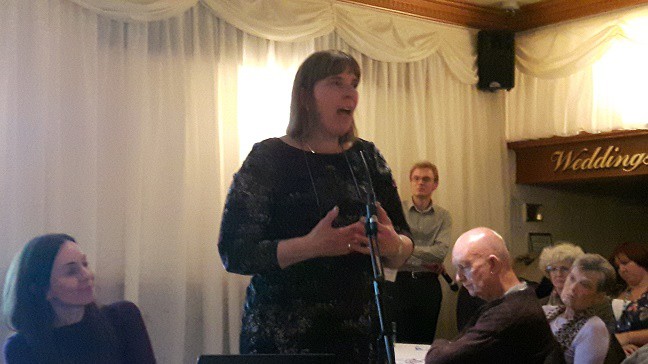
Caroline Selkirk, Managing Director for the four east Kent clinical commissioning groups, said: “We need to modernise local health services so our highly trained expert staff have the support they need to deliver 21st century care for local people.
“People want more care in their communities, with access to excellent hospital services when they need it – we’ve heard that loud and clear from patients, the public, our staff and partners.
“Everyone involved in this work is passionate about getting it right for patients and this takes time. It’s a significant project which potentially involves major changes. We have to look at this in forensic detail and make sure we get it right, not just for people today but for future generations.”

Save Our NHS in Kent spokesperson Helen Whitehead (pictured right) said: “”We are, as always, fighting for adequate provision throughout all areas. East Kent needs three excellent hospitals; not further reduction in services across sites. Thanet and East Kent are growing areas; the provision being planned for now does not adequately provide for the current population, let alone future growth.
“Time critical care such as accident and emergency needs to be available across all sites; Canterbury’s previous loss has both disadvantaged their population and increased stress across QEQM and Ashford sites, and this pattern will continue if services are further reduced. It is worth remembering that Urgent Treatment Centres only have to be “GP led”, with no requirement for a GP to be on site; they are not an adequate replacement for full accident and emergency and should not be portrayed as being so.
“We agree with Caroline Selkirk in one aspect; it is indeed vitally important to ” – look at this in forensic detail and make sure we get it right, not just for people today but for future generations.” Every area must be adequately served by these plans. Currently, they are not, and the strains on the system will only increase as our population demographics change. A reduction in services overall will never serve these populations effectively, nor will it attract medical professionals to vulnerable areas.”
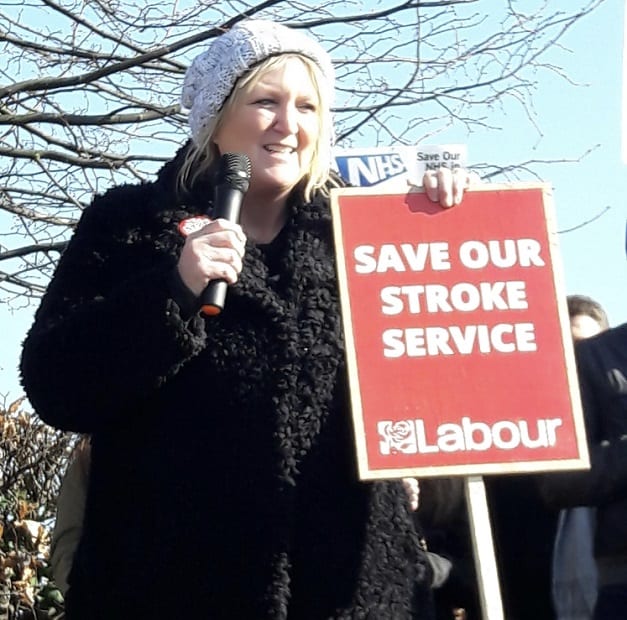
County councillor Karen Constantine added: “I read these plans with great concern. We mustn’t oppose NHS changes for the sake of it, nor because what is new to us is often ‘strange’ to us. We are creatures of habit largely speaking, and we don’t like change.
“But there are changes taking place in the NHS, driven by solid clinical evidence that we should embrace. The introduction of advanced nurse practitioners for instance. We may ‘prefer’ to see a GP. But an ANP will be a very adequate clinician too and will meet many of our health needs.
“I’ve also no doubt that once all the operational issues that remote contact with a relevant health professionals are ironed out. ‘Skyping’ in for a consultation will be a hit with many. But it will not suit everybody.
“Any change needs to planned well and resourced so that it can deliver. The most valuable resources in the NHS are largely staff. We really need plain speaking and key questions on staffing need serious answers.
“Currently our NHS in East Kent is in debt, running a whopping deficit of £420m. There is also a chronic staff shortage. Across England we need to train, recruit and retain 40,000 nurses. Currently only 50% of GPs in Kent are on a contract. The rest are on locum contracts. You can see staffing levels are an issue.
“Yesterday the annual NHS staff survey results were released. The results that came from the responses of almost half a million NHS employees are devastating.
40% of staff report work related stress.
60% of staff report working unpaid additional time.
30% of nurses are think of leaving their jobs.
“As I put to the KCC HOSC this morning the money from central Government is insufficient to meet current need and the removal of the nursing bursaries has had calamitous impact. Workforce is not keeping pace with patient need.
“On this basis I cannot agree that either option 1 or 2 is fit for purpose. We need to attend to the basic issue of workforce. And fast.”
The news comes on the heels of the approval to create three hyper-acute stroke units in the region, with QEQM Hospital’s acute service due to close. The nearest HASU to Thanet will be at the William Harvey Hospital in Ashford.
More information about the possible options is available at https://kentandmedway.nhs.uk/where-you-live/plans-east-kent/east-kent-options-summary/

